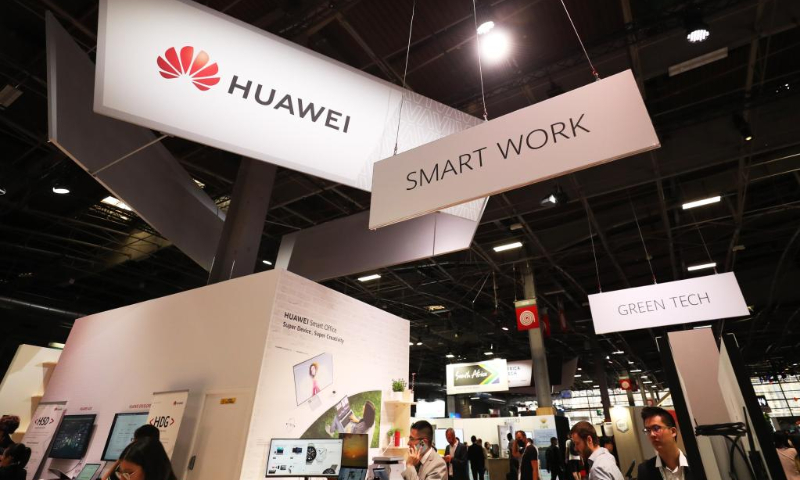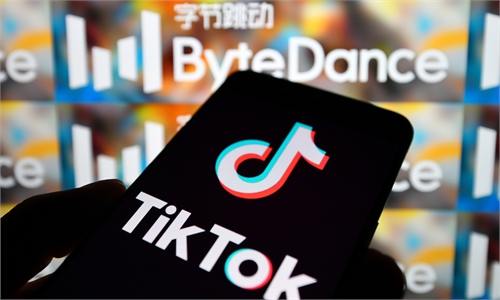Complete US ban on Huawei a 'paranoid, last-ditch' move, set to bite US companies more

Attendees visit the Huawei pavilion at VivaTech technology startups and innovation fair during its opening day in Paris, France, June 15, 2022. (Xinhua/Gao Jing)
The Biden administration has reportedly halted approving licenses for US suppliers to export most items to Chinese tech company Huawei, and is weighing complete ban to cut Huawei off from all American suppliers, a sign that paranoid Washington has taken its relentless assault on the Chinese tech industry a step further and morphed it into a geopolitical battle for supremacy.
Targeting Huawei, a representative of China's rising high-tech industry, is not a new development, as the tech giant was added to the US trade blacklist four years ago. But what is ironic, according to observers, is that after years of "whack-a-mole" restrictions on a raft of Chinese tech firms, the Biden administration had to abruptly jump back to the original target.
The playbook not only lays bare that the US' export controls were futile in undercutting Chinese tech capabilities, but also mirrors Washington's desperation to "up the ante" ahead of the so-called second Summit for Democracy in March, during which it aims to rope in more allies to push for industrial decoupling with China.
The ban, when coming into effect, is estimated to have certain impacts on Huawei's smartphone and laptop businesses, though the Chinese company could substitute American suppliers with other companies such as MediaTek. The controls will strike at US companies more, which are already grappling with sliding revenues and huge layoff pressures, analysts warned.
They also voiced confidence over China's ability to withstand the impact of the potential ban, as the country's preparation and countermeasures to the US offensive have grown increasingly mature over the years. From the industrial perspective, key tech breakthroughs have been achieved, and from the country level, government gestures have switched from defending to proactively counter-attacking, industry insiders said.
The Biden administration has stopped approving licenses for US companies to export most items to Huawei, Reuters reported on Monday, citing people familiar with the matter.
The Chinese company was restricted several years ago from importing 5G and other technologies from the US, but the US Department of Commerce then approved licenses for some American firms, including Qualcomm and Intel, to sell certain goods to Huawei, mostly technologies below 5G standards.
Meanwhile, Washington is considering extending the ban to all US imports, though the "discussions are at an early stage," a Bloomberg report said on Monday. This could include items below the 5G level, such as 4G items, WiFi 6 and 7, artificial intelligence, and high-performance computing and cloud items, according to the Reuters report.
In response, China's Foreign Ministry spokesperson Mao Ning said at a routine press briefing on Tuesday that the cutoff is pure "technological hegemony," and China strongly opposes the US' generalization of national security concepts and extending abuse of state power to suppress Chinese companies.
The country will firmly safeguard the legitimate rights and interests of Chinese firms, Mao said.
'Paranoid, last-ditch' move
Some industry insiders describe the complete ban as a "paranoid, last-ditch" move that shows that while the US has been marshaling all its tools to curb China, all seem to have failed to achieve the desired results. It is also increasingly running out of cards and having to dive into more medium and fundamental-level spheres.
"Washington's logic works like this: If the US was able to beat down Huawei, a symbol of China's tech prowess, it could cripple the upward momentum of the Chinese tech industry, and hammer entrepreneurs' thriving confidence. But the strategy conspicuously did not work," Ma Jihua, a veteran telecom analyst, told the Global Times on Tuesday.
Since putting Huawei onto the entity list in May 2019, the US has launched a full-fledged tech war against China. A flurry of over 100 Chinese tech giants and start-ups have been targeted since then, including TikTok, ZTE, SMIC, Yangtze Memory and DJI, citing claimed national security threats.
The blockade had neither stopped Chinese companies' development nor their tech self-sufficiency quests.
Huawei's rotating chairman Eric Xu Zhijun said in December 2022 that Huawei's overall revenue is expected to achieve 636.9 billion yuan ($91.59) billion in 2022, marking a critical stage of the company that has "successfully pulled ourselves out of crisis mode." Xu noted that Huawei's ICT infrastructure business has maintained steady growth, and the decline in device business has abated despite US pressure.
Discussions on the measures were also revealed at a time when the US is ramping up pressure on allies, including the Netherlands, to join its cliques that exclude China. It also comes ahead of "the Summit for Democracy" in March, an arena which the US deems very important to pool allies' strengths to further isolate China.
"Washington is taking advantage of the potential ban on a signature Chinese tech company, to showcase its allies that it occupies a dominant position in the chip and tech industry chain," Ma said.
Double-edged sword
A decision on the complete ban could be announced in May, coinciding with the four-year anniversary of Huawei's addition to the entity list, Bloomberg reported on Tuesday.
But Chinese industry insiders doubt whether the US has the audacity to fully execute the measures, as such controls are a double-edged sword that could end up backfiring, and that US politicians are always "all bluster, but little take action."
Xiang Ligang, a veteran telecom observer, told the Global Times on Tuesday that the ban would hurt the commercial interests of US suppliers that deeply cooperate with Huawei, especially those already facing meager profit results.
By 2025, US companies could lose 18 percentage points of global share and 37 percent of their revenues if the US completely bans semiconductor companies from selling to Chinese customers, according to a report by Boston Consulting Group issued in March 2020. The previous restrictive measures have already sliced billions of dollars off American chipmakers. Intel's revenue declined 32 percent year-on-year in the quarter that ended December 31, the fourth consecutive quarter of falling sales as the market for personal computers retreats in the US.
Intel declined to comment on the news in response to the Global Times' inquiry.
Xiang said that at the same time, Huawei's consumer business would also be impacted, as companies like Qualcomm and Intel are important suppliers of Huawei's smartphone and laptop businesses.
But observers also took note of the possibility of sourcing elsewhere, such as from MediaTek, as well as Huawei's stepped-up efforts to make breakthroughs in bottleneck technologies.
In the broader picture, the situation in China is markedly different from four years ago, when many tech practitioners were not yet prepared for a US-led decoupling push.
At the government level, China has proactively spurred homegrown innovation and organized counterattacks against US hegemonic practices. It has also strengthened communication and cooperation with US allies.
In December, China filed a lawsuit with the WTO over the US' discriminatory measures on its chip industry, firing the first shot of a slew of counterattacks against US suppression.
It is believed that US allies and US enterprises will tend to be pragmatic when handling the requirements from the US government and find a new balance that fits their commercial interests, Tian Yun, an independent economist, told the Global Times.
For example, in the case of lithography machines, recent media reports claimed that the US has pressured the Netherlands to ban exports of ASML's chipmaking machinery to China. But in a phone call between Chinese Foreign Minister Qin Gang with Dutch Deputy Prime Minister and Foreign Minister Wopke Hoekstra on Monday, Hoekstra said the Dutch side will continue to handle trade and economic issues with China "in a responsible way," suggesting a certain level of resistance toward meekly following US orders.

